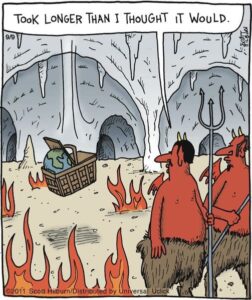
Some of you may have recognized the title of this article as a motto from a humorous bumper sticker.
Truth be told, that is precisely where I got it!
Why did I chose this title instead of something more pedestrian — or even more importantly — original? Because a broad spectrum of Americans — including Christ-followers — are currently asking themselves some variation of these questions.
I believe the Holy Spirit wants me to take a shot at providing something of an answer for you. Before we go tilting at that particular windmill, I would like to address where I’m coming from on this matter.
As a theologue, I constantly walk a tightrope, balancing the strong messages I hear from the Lord with the humility He requires of me while delivering them. As I’ve stated in my articles on humility, I am absolutely not staking out any kind of moral high ground from which to pass judgment because:
- Such a place simply does not exist in the first place, and;
- I am personally disqualified from occupying it if there was one.
We are all God’s handiworks-in-progress as we stumble towards the Light together. I simply have the dubious honor of being one of those called to help refine our focus and sense of direction as we do so.
This is Part 1 of what I believe will be a 2-part series. Because certain topics occasionally take on lives of their own, we’ll see if my original estimate survives the heat of battle.
In this first installment, we’ll tackle this topic from a historical perspective. In the second half, we’ll approach it from the spiritual.
Secular Humanism’s Relentless Assault on Christianity
I’ve already delved into what defines this idolatrous world religion and its tenets, so I will not rehash that content here. Feel free to read that at your leisure.
The Big 3 Heresies
I have also written elsewhere here how the 3 great Christian heresies are:
- Judaizing
- Gnosticism
- Arianism
Every Christianity-based cult adheres to at least one of them. These heresies have been attacking the church since the 1st century. Several NT epistles were directly or indirectly written to refute them. I’ve offered my own refutations of Gnosticism (Jesus is entirely God and not human) and Arianism (Jesus was all human and not divine) specifically as well as in passing here at Miscellaneous Ramblings.
However, after reviewing both Church and human history, I’ve revised my opinion a bit to conclude the true archenemy of Christianity is actually secular humanism and has been all along. The “great heresies” are merely individual expressions of that underlying worldview, all built on secular humanism’s tragically flawed foundation.
That fraudulent foundational premise is this: our corrupt human intellect trumps divine revelation. All of the aforementioned heresies arose from a refusal to accept the divine mysteries of salvation by grace and Jesus’ incarnation.
The Follow-up Assaults
Heresies notwithstanding, secular humanism itself almost immediately began directly asserting itself through various early church fathers such as Justin Martyr, Origen, and Augustine, all of whom tried to syncretize neoplatonist philosophy with Christianity.
- syncretize
- attempt to amalgamate or reconcile (differing things, especially religious beliefs, cultural elements, or schools of thought)
- Neoplatonist
- a school of adherents to the philosophies and teachings of Plato which began in the 3rd century AD
My favorite leader in early church history once stated:
What has Athens to do with Jerusalem, the Academy (of Plato) with the Church?Tertullian, Bishop of Carthage ca. 200AD (parenthetical mine)
In other words, Tertullian was convinced the Truth of Christianity far outstripped anything Greek philosophers had to offer. Most notably, Tertullian clearly and categorically rejected all theological studies not firmly rooted in primary sources directly attributable to the apostles. He believed Scripture rendered the Greeks’ writings completely irrelevant to believers — especially theologically. He was convinced Christians should embrace God’s Word to the complete exclusion of anything smacking of humanistic worldviews.
My sentiments precisely!
Tragically, Tertullian and his theological cronies eventually lost that battle. As the centuries passed, the Church (which later devolved into Roman Catholicism) increasingly embraced humanism at the expense of the Scriptures. Over the centuries, the Pope and church tradition eventually supplanted God’s Word as the authorities over Christian faith and practice.
Thomas Aquinas
The person who cemented humanist ideology firmly at the helm of Roman Catholic (RC) thought was a medieval Dominican monk named Thomas Aquinas, himself a huge devotee of yet another pagan Greek philosopher, Aristotle. While by all accounts he was a towering intellect — probably the pre-eminent thinker of his age — he was also living proof that genius does not automatically preclude doctrinal error. His major theological faux pas is actually a definitive heresy. Here is his bogus concept in a nutshell:
The Partial Depravity of Man
Our inherent sin nature corrupts our ability to choose right conduct, therefore moral perfection is absolutely unattainable in this life.
However, our perceptions, understanding, and intellects are not so corrupted.
Thomas Aquinas
In summary, he thought we can figure everything out apart from divine revelation while conceding we cannot consistency choose to do the right thing once we discover it.
With that single faulty misconception, he exalted human reason to be equal to Scripture, thus dooming millions of people in succeeding generations to hell.
Thanks for nothing, Tommie!
The Protestant Reformation
Fast forward another century or so to our first major figure to publicly proclaim Protestantism’s major doctrinal themes, a professor at Oxford named John Wycliffe. He also translated the first-ever English version of the New Testament. Wycliffe died of a stroke before he could be martyred by the RC hierarchy.
Yet another century later, Wycliffe’s writings influenced a cleric from Bohemia (now the western portion of the Czech Republic) named Jan Huss. Huss was burned at the stake as a heretic by the RC hierarchy.
Another hundred or so years after that, Martin Luther arrived on the scene. He was initially unaware of either Wycliffe or Huss, but later affirmed his agreement with Huss doctrinally. Hard on Luther’s heels in the Protestant timeline came John Calvin in Switzerland and John Tyndale in England.
All of these men stood on the 5 “solas” of the Reformation:
- Sola scriptura (Scripture alone)
- Sola fide (faith alone)
- Sola gratia (grace alone)
- Solo Christo (Christ alone)
- Soli Deo gloria (to the glory of God alone)
You may have read or heard the middle 3 summarized in the following sentence: “We are saved by grace alone through faith alone in Christ alone.”
Of these seminal leaders, both Luther and Calvin tragically perpetuated Augustine’s syncretism of Neo-Platonism and Christianity into the mainstream of Protestant theology.
Oops!
Why is All This Any Never-mind?
If I offered you a bottle of water, informing you beforehand it contained a non-lethal dose of a deadly poison in it, would you drink it anyway?
I certainly wouldn’t!
And that, my friends, is the monster raising its ugly head every time we syncretize any amount of secular humanism into the Christian worldview. And trust me, Christendom has allowed far, far more than a minuscule amount!
The Church’s Epic Fails in Modern History
As a result of all this — coupled with mankind’s pietistic tendencies — the Body of Christ has seriously blown it over a couple of major social issues.
The first is the issue of racial equality and the second is what Francis Schaeffer labeled the “compassionate use of accumulated wealth.” Tragically, Christendom, the institutional expression of the Church on the earth, has been on the wrong side of these issues for way too many years.
In many cases, those labeling themselves “Christian” typically justified such abuses using so-called “science.” Tragically, that was philosophically rooted in Darwinism, thus relieving them of responsibility to obey what the Scriptures clearly demanded of them.
In the vast majority of cases, the cries of the oppressed have been met with apathy — even antipathy. One of the major reasons secular humanism has gained such a foothold is because Christendom, typically conflated in popular misperceptions with Roman Catholicism, has consistently sided with oppressors rather than the oppressed for centuries. An excellent case-in-point is pre-revolutionary France where the Catholic Church staunchly allied itself with the royalists. Because of this, the secular-humanism-driven French Revolution and The Terror which followed not only rejected the concept of royalty, but also what they perceived as Christianity.
Racial Equality
One of the greatest tragedies of modern Civilization can be laid directly at the feet of European Anglo-Saxon Protestant pietists and skeptics alike. They somehow concluded all people of color and other ethnicities (e.g., Irish and Jewish) were intellectually inferior to white folks due to inherent racial factors. The 17th-19th centuries were rife with pseudo-scientific claptrap supporting such nonsense among the intelligentsia of that day, including The British Royal Academy, among many others. I’ve already dealt with racism elsewhere, so I will not belabor those points again here.
This is a clear-cut case of “born-on-third-base-thinking-you-hit-a-triple” syndrome. Yes, Western Civilization has triumphed over all the other cultures of the earth regardless of what era you care to pick since Jesus resurrected. Human rights and personal freedoms under the law, capitalism, modern science/technology/medicine, and a host of other such crucial developments arose directly from the West and no one else anywhere else has even come close. But the major breakthroughs of Western Civilization have resulted from its Judeo-Christian philosophical underpinnings rather than any supposed racial superiority of whites over everyone else.
It was this kind of tragically flawed thinking which conceptually justified chattel slavery of Africans and Asians throughout the world as well as a host of other atrocities committed by Europeans.
It is entirely safe to conclude this kind of racist nonsense has poisoned Caucasian relations with people of color ever since — every society on this planet is still paying the price for it.
While vocal abolitionists in the North were almost universally Christian believers, they were initially a minority within the ostensibly Christian culture surrounding them. The 1st and 2nd Great Awakenings transformed American social values to the point where hundreds of thousands of Union soldiers eventually died to abolish slavery within the United States.
That being said, the pseudo-scientific Darwinist nonsense underpinning white supremacy philosophically was still very much alive and well on both sides of that conflict. It took over a hundred years after the South’s surrender for that kind of racism to be educated out of most Americans’ thinking and relegated to only the ignorant.
In the South, the denominations operating there actually sided with the slave-owners in suppressing blacks, the Southern Baptist Convention being a primary one.
Compassionate Use of Accumulated Wealth
Hand-in-hand with racism has been the oppression of the poor by wealthy folks ostensibly proclaiming themselves to be Christians (and, no, I’m not headed down that socialism nonsense rabbit-hole, so cool your jets, fellow conservatives!).
What I am referring to is the rich becoming reservoirs rather than being channels of blessing.
What the industrialists and robber barons of the Gilded Age should have done was:
- Help alleviate the plights of widows and orphans,
- Create safe and healthy working conditions for their miners and factory workers, and;
- Prevent the virtual enslavement of women and children in sweat-shops
 Because they didn’t, socialism as a philosophy — and its organizational expression, trade unions — found fertile soil in which to take root and thrive. Marxism has burgeoned philosophically only because self-absorbed rich folks couldn’t be bothered to get off their blessed assurances and do anything meaningful to help those less fortunate than themselves.
Because they didn’t, socialism as a philosophy — and its organizational expression, trade unions — found fertile soil in which to take root and thrive. Marxism has burgeoned philosophically only because self-absorbed rich folks couldn’t be bothered to get off their blessed assurances and do anything meaningful to help those less fortunate than themselves.
The tragic aspect of that is God has promised repeatedly in His Word to prosper those who use their wealth to alleviate the suffering of the poor, widows, and orphans, so it is entirely unlikely any of those fabulously wealthy industrialists would have ever missed the funds expended. While John D. Rockefeller was absolutely no saint, he indeed possessed such a mindset and towards the end of his life tried to give his entire fortune away. Despite his best efforts, he simply couldn’t give away his money fast enough — his wealth grew far faster than his benevolence. And he gave away millions!
As far as wealth is concerned, again the churches were either anemic or silent in their responses to the unsafe, unhealthy working conditions and workplace abuses perpetrated by mine and factory owners during the Industrial Revolution.
A Modern Case-in-Point
During the 1980s, Christendom went all-in with Anita Bryant’s knee-jerk anti-gay rhetoric. My position on homosexuality is well documented, so I will not rehash that here. But I do have to say that the Church’s anti-gay hate-speech has fueled, rather than hindered, the LGBTQ+ movement. How so? By essentially immunizing them to any and all attempts at compassionately presenting the Gospel of Christ so they can find their freedom.
In Closing
These are all historically indisputable facts.
Rather than being perceived as winsome, loving, compassionate, gracious, and generous, Christians are instead regarded by modern society as obnoxious, self-centered, callous, rude, and tight-fisted. As our pastor taught recently, the spiritual orphans of this world look at the Church and don’t see a family on mission, they simply see a bunch of other spiritual orphans who spout religious buzzwords.
The question we each need to prayerfully ask ourselves as Christ-followers is this:
Which of those two camps do I fall into?
I will leave you to ponder the answer to that question before His throne of grace.
Thanks for reading!
The Spiritual Perspective
